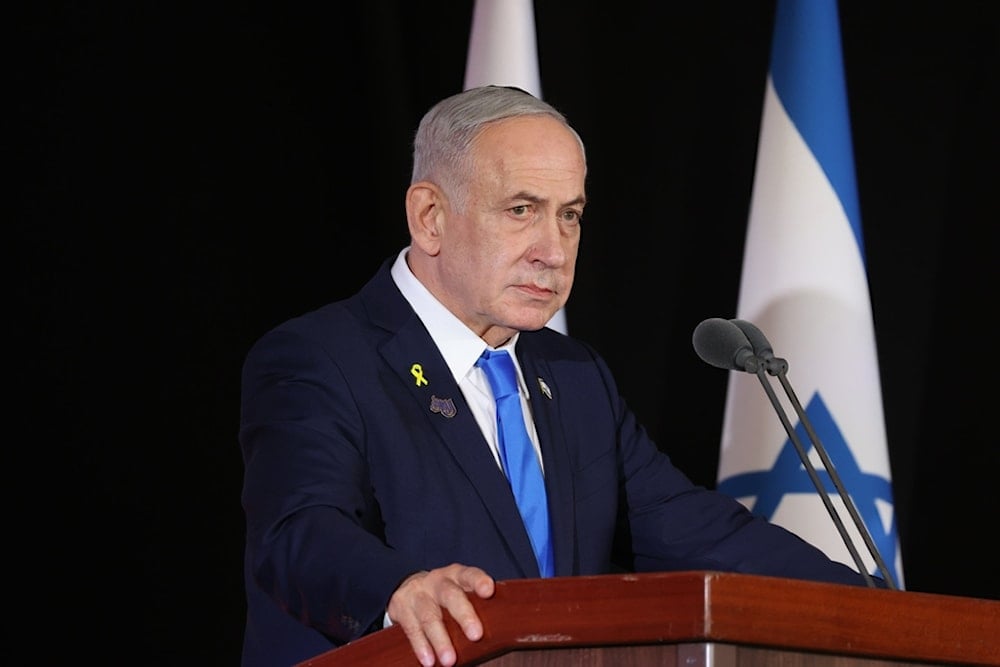Netanyahu reveals details on Sayyed Nasrallah strike, pagers attack
Israeli PM Netanyahu reveals new details on "Israel's" terrorist pager attack in Lebanon and the assassination of Sayyed Hassan Nasrallah, saying the plan bypassed the US.
-

Israeli Prime Minister Benjamin Netanyahu participates in a memorial ceremony for the soldiers killed in the war on Gaza, at Mt. Herzl, in occupied al-Quds, Thursday, October 16, 2025. (AP)
Israeli occupation Prime Minister Benjamin Netanyahu has publicly revealed, for the first time, new details surrounding the pager attack, the bombing in Lebanon that targeted Hezbollah Secretary General Sayyed Hassan Nasrallah, as well as other developments in the region.
In a new TV interview cited by Israeli daily Maariv, Netanyahu said, “We had set a date for the war in the north, then I discovered that Hezbollah had sent two pagers to Iran for inspection.” He added, “I asked: When did this happen? They told me a week ago. I said: What? Immediately, I gathered the heads of the security establishment, and we decided to launch the pager operation.”
Netanyahu also spoke about the assassination of Sayyed Nasrallah, saying, “We were in a Cabinet meeting, and there was no consensus. I said I would think about it.” He went on to claim, “I traveled to the United Nations to deliver my speech, and on the plane, through a secure line, I decided: Let's do it.”
Netanyahu added, “If we had told the Americans that we were going to target Nasrallah, the information would have leaked within five minutes.”
'War with Iran is not over'
Addressing the war with Iran, Netanyahu said the confrontation “is not over,” revealing that he spoke with US President Donald Trump last Thursday. “We are ready to do whatever is necessary if the need arises,” he stated, hinting at potential future aggressions.
On another front, Netanyahu appeared to allude to coordination with Trump regarding the attack on Qatar, saying he had briefed the US president on the matter.
Discussing his political future, Netanyahu confirmed his intention to run in the upcoming elections, saying, “I believe I will succeed.”
Israeli strategic sites destroyed
The spokesperson for Iran’s Islamic Revolution Guard Corps (IRGC), Brigadier General Ali Mohammad Naeini, warned in late September that Iran's enemies should not repeat their mistakes, stressing that any new aggression would face a "broader, more destructive, and more decisive" response.
Speaking on the occasion of Sacred Defense Week, the annual commemoration of the 1980-1988 Iran-Iraq War, Naeini confirmed that the IRGC had targeted and destroyed 26 strategic sites during the 12-Day War. "We destroyed them completely," he declared, underscoring the scale of Iran's military response.
During Operation True Promise 3, Iran launched hundreds of missiles in 21 waves against strategic Israeli military, intelligence, and infrastructure targets across occupied Palestine.
The strikes severely damaged the Israeli Military Intelligence Directorate (Aman) in Tel Aviv as well as Mossad’s headquarters in Glilot, where missiles landed near the agency’s main complex. HaKirya, the military command headquarters in Tel Aviv adjacent to the Security Ministry, was also hit in the operation.

 3 Min Read
3 Min Read










